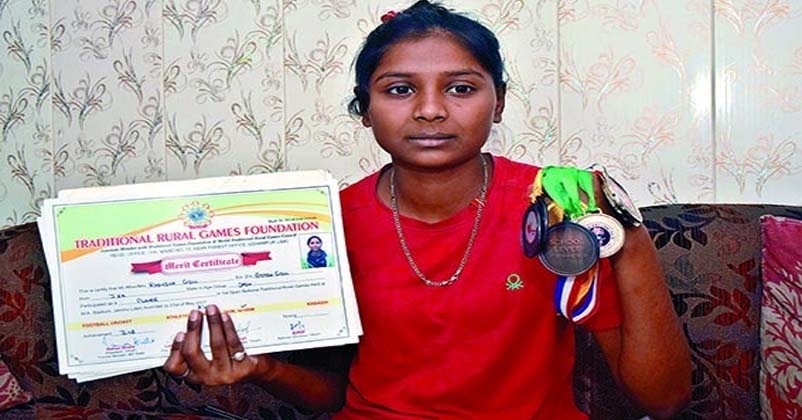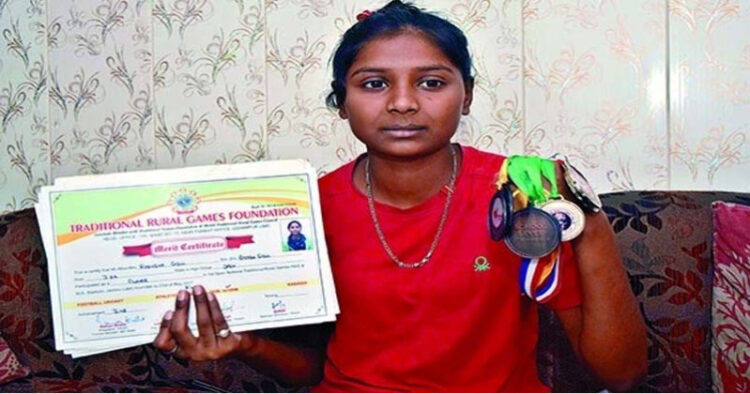
Today, August 5th is the first anniversary of abrogation of Article 370 from Jammu and Kashmir. Athlete Radhika Gill is in the news just before the completion of a year of the historic move by government of India. Team JammuKashmirNow has made a documentary film on this state level athlete which showcases the struggle of the dalit girl before Article 370 and 35A was repealed.
The documentary has become viral and is being shared millions of time by netizens including Bollywood celebrities, Union ministers, professors, political parties. The message of the documentary is that with the abrogation of Article 370 and 35A, all citizens in Jammu and Kashmir have now got equal rights. It also shows that Today there our constitution is equally in force throughout the country.
Who is Radhika Gill
22-year-old Radhika Gill is a state leve athlete from Jammu. Radhika’s father Charan Singh works as a cleaning in Jammu. For many years, Radhika had the ability to get a good government job on the basis of her performance in sports and studies. But due to article 35, she did not have the right to get a good government job in Jammu and Kashmir. Radhika Gill belongs to the Dalit Valmiki community and till a year ago, as per Article 35A she could work only as a sweeper in the state. Radhika had also filed a petition in the Supreme Court challenging Article 35A.
Article 370, 35A repealed
After the Articles 370 and 35A applicable to Jamu and Kashmir were repealed on August 5 last year, residents of all Dalit communities including thousands like Radhika Gill have got equal rights. Once Article 370 was gone, Radhika today has the right to apply for any government job commensurate with her performance in sports and studies. Also, under the new Domicile Act, she now has got citizenship of Jammu and Kashmir too.
Radhi Gill’s story goes viral
Anupam Kher tweeted the video and wrote “On the first anniversary of abrogation of article 370 I share with you the story of Radhika Gill from Kashmir. It is just the beginning! Every life in Kashmir will change for better!?? @JammuKashmirNow Justice Delayed But Delivered.”
BJP leader Kapil Mishra tweeted the video and wrote about how terrible atrocities on Dalits were caused by Article 370. Article 370 tied the women of Kashmir in chains, he tweeted.
BJP4India tweeted a video from its official Twitter handle, writing that Article 370 was anti-women, anti-Dalit and anti-tribal.
BJP national vice-president Baijayant Panda tweeted the video saying that in his Oxford Union debate last year, he had mentioned Radhika Gill, a young Dalit woman who was facing severe discrimination. “A year of change, this is her story”, he tweeted.
JNU professor Anand Ranganath has also tweeted the video and wrote “As Indians celebrate the first anniversary of the abrogation of Article 370, NEVER forget how those who claim to fight for Dalit rights ignored the plight of Radhika and a million oppressed like her. But Truth and Justice need no allies. They sparkle in the eyes of Radhika Gill.”
Union minister Dr. Jitendra Singh tweeted the video and wrote that Jammu and Kashmir has changed after August 5, 2019. “This is what changed for the deprived youth in #JammuAndKashmir after 5 August 2019”, he tweeted.
Bollywood director Ashok Pandit tweeted the video and wrote “This is #NayaJammuKashmir under the leadership of @narendramodi ji. Proud of Radhika Gill. She is an inspiration to all of us. Thank you @JammuKashmirNow for this tribute to her.”
In addition to this, thousands of countrymen shared this video and saluted the struggle of people like including Radhika Gill, who were involved in the fight to remove Articles 370 and 35A. At the same time, the Narendra Modi government was praised for changes brought in Jammu and Kashmir, where every citizen irrespective of community and religions have got equal rights. Many opined that J&K is truly moving towards development after 73 years after independence.
History of struggle against Article 370 and 35A
In 1957, all the sanitation workers of Jammu and Kashmir sat on a dharna to demand a raise in the salary. Then the then Prime Minister of Jammu and Kashmir, Bakshi Ghulam Mohammed (till a few years after independence, the head of Jammu and Kashmir power was called the Prime Minister) called the families of about 200 Valmiki community from the state of Punjab to Jammu and Kashmir.
According to a cabinet decision, they were specifically called to be appointed as scavengers. But in spite of having worked as sweepers for the past 63 years in Jammu and Kashmir, they were not considered as citizens here. Their present generations after many decades, did not have the right to good jobs in government or to study in government institutions. It is due to this discrimination, even talented children like Radhika Gill were forced to work as cleaners or scavengers.
However, after Article 370 and 35A were repealed, all the citizens of J&K have got equal rights. All citizens have also secured citizenship under the new domicile law.
(News source: JammuKashmirNow)














Comments